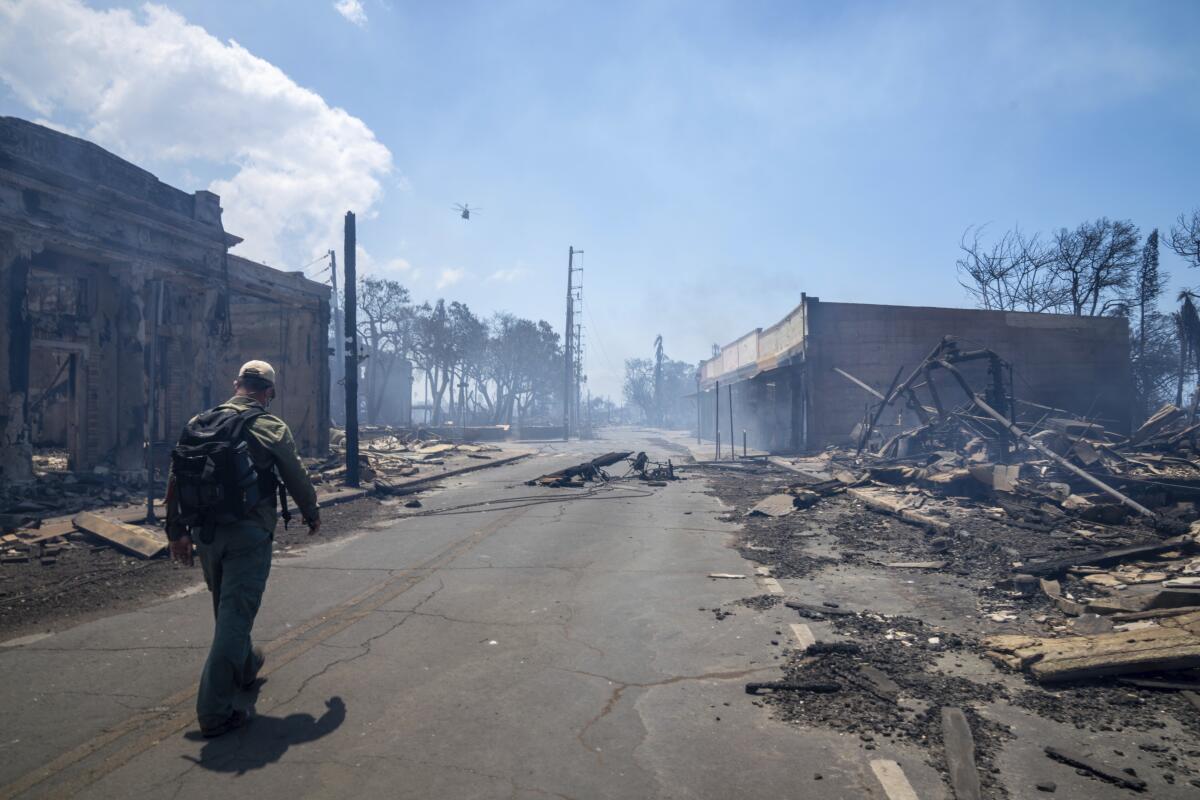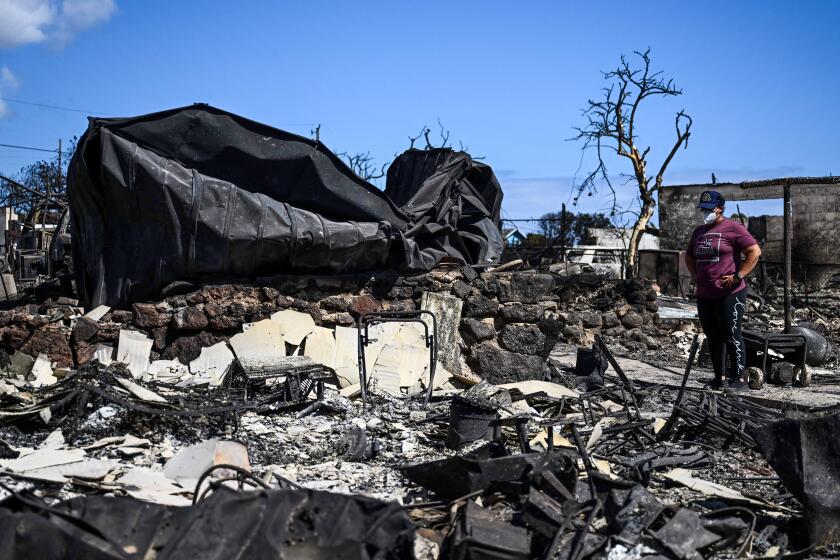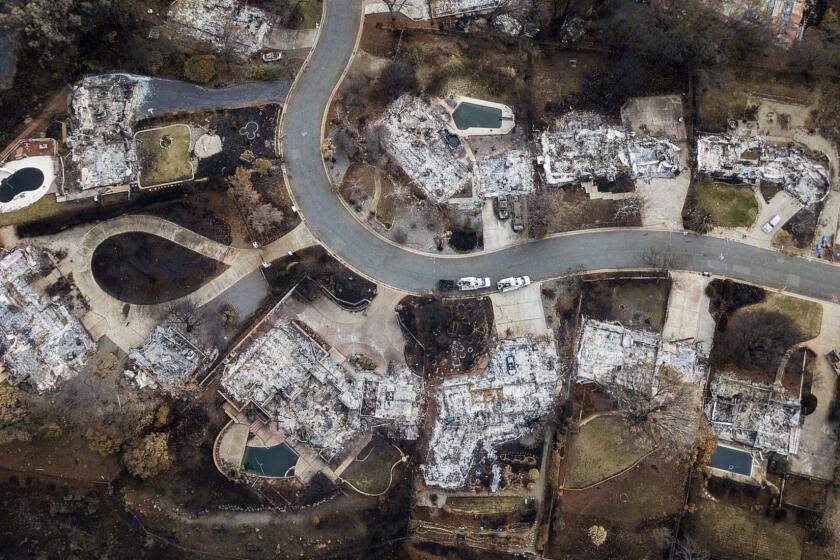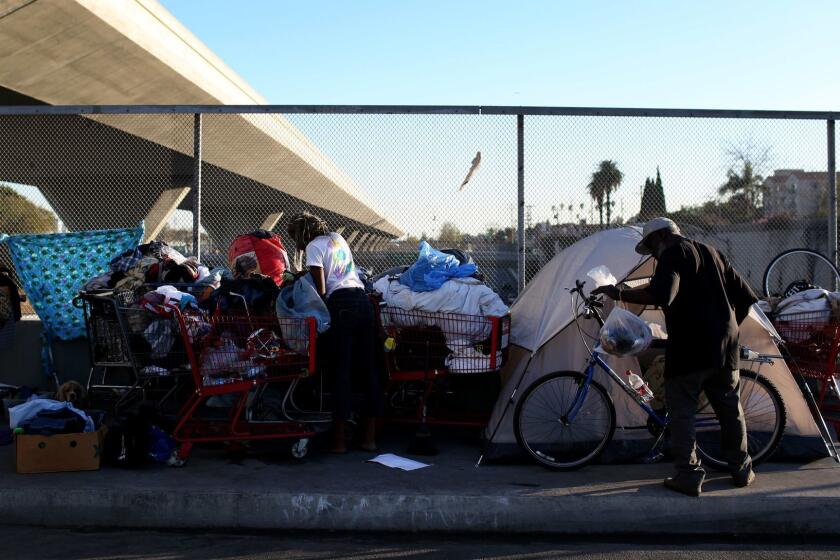We survived the Paradise fire. For Lahaina survivors, escape from hell will mark them forever

- Share via
My wife and I will soon observe the fifth anniversary of the Camp fire that wiped out the town of Paradise in the foothills of Northern California, taking our home and everything we had except for the car we were in and the very few things we gathered as the fire drew nearer.
Five years is long enough that we have almost begun to forget. Until another even more deadly fire wipes another town from the face of the Earth: Lahaina.
As Hawaii begins to tally the damage and assess how to improve its safety procedures to address extreme fire weather, California can offer many lessons.
It took us nearly 10 hours to make the drive to Sacramento on Nov. 8, 2018, a trip that usually took two. The smoke from the enormous fire behind us followed us; within a few days, Sacramento recorded the worst air quality in the world. Even now, it can seem like we’re still traveling that winding road.
It was an anxious drive, with three very unhappy cats in the backseat. We drove through heavily wooded terrain on a road that only recently had been paved. (My wife and some of her friends had been among those who pressured to get that road paved. Had that not happened, more people would surely have been lost.)
The fire was creating its own weather, with sweeping changes in the direction the wind blew. Drought, which would break a few weeks after the damage had been done, had colluded with the wind to make conditions ripe for disaster. Around every bend, we wondered if the road might deliver us to more fire.
I am writing this just days after the Camp fire wiped out everything we had and nearly everything we were familiar with.
Throughout that drive, we held fast to the hope that our home and our belongings would be spared, that we’d return to resume our lives in a few days. We would later learn, of course, that the fire had taken the town, killing 85 residents as it ravaged the Paradise ridge.
We fretted about Callie, the cat we couldn’t catch, reassuring ourselves that she’d be waiting for us on the back deck when we returned. My last memory of her still haunts me, seeing her look my way before running off.
We didn’t yet know the causes of the fire, but the subject of global warming came up during that long drive. We also knew we weren’t the first to be stricken by such an “unnatural” natural disaster, knew that what was befalling us was bound to be repeated with increasing frequency as the years unfolded, the temperatures increased, the world’s leaders dithered, and the places to take refuge became ever more scarce.
Just two years later, another town in our neck of the woods would go up in smoke when Greenville, an hour from Paradise, burned to the ground in August 2021.
In mid-April I found myself once more driving a U-Haul pickup truck from my former home on the Paradise ridge to our new digs in Sacramento.
And now Lahaina, where the death toll is more than 90. As it happened, the conflagration there took place just two days after our eldest daughter arrived on the island to mind a house in Kula and tend the cats for some people who were going to be away. The “up country” Maui fires threatened Kula, on the slope of the Haleakala volcano. As Lahaina burned, our daughter gathered up the two cats she was caring for and headed downhill, to tentative safety in Haiku.
It was touch and go for a few hours, but as I write these words, the cats are OK, the house is OK, our daughter is OK, and fire is no longer an immediate threat to Kula.
The sorrows that accompany wildfire can never be fully tallied, even after the flames are under control. The smoldering rubble is toxic. The dead are not all yet accounted for. Relatives await news with hope and dread. Survivors are trying to anticipate the future, proceeding with inadequate information about insurance claims and the prospects for rebuilding, not at all sure of where to go if they can’t rebuild, but they know things will never be the same. What fire survivors need is nearly everything. Much of what they’ve lost can never be replaced.
Since the fire that wiped out Paradise and Magalia, Calif., — and my house — on Nov. 8, I’ve thought about the homeless every single day.
We all know there are more such disasters to come, more news of more places obliterated by fires, floods and famine caused by the impact human beings have had on the only home we know. The tragedies are already becoming routine. Back when London was burning during the blitz in World War II, Prime Minister Winston Churchill was quoted as saying, “If you’re going through hell, keep going.”
For us, the drive out of Paradise was hell, but we kept going, the smoke eventually cleared, life resumed, losses grudgingly accepted, and challenges we had never fully imagined were faced.
Our insurance did what it had been purchased to do, enabling us to put another roof over our heads with a mortgage to go with it. We bought pots and pans, sheets and pillows, and dozens of necessities we had taken for granted for so long. The memory of it all has receded enough for us to begin taking things for granted again, at least until another one hits the news and forces us to relive it.
An escape from disaster will mark you forever more, so you’d do well to tuck Churchill’s advice into your go-bag now, against the day the next one threatens you, wherever you are.
Jaime O’Neill is a retired community college teacher and freelance writer who lives in Sacramento.
More to Read
A cure for the common opinion
Get thought-provoking perspectives with our weekly newsletter.
You may occasionally receive promotional content from the Los Angeles Times.













